
Indian scholar lauds Vietnam's efforts in containing COVID-19 pandemic
Latest
| TIN LIÊN QUAN | |
| Vietnam, US forge comprehensive partnership in fighting against COVID-19 pandemic | |
| Cambodia grateful for Vietnamese NA’s support in fighting COVID-19 | |
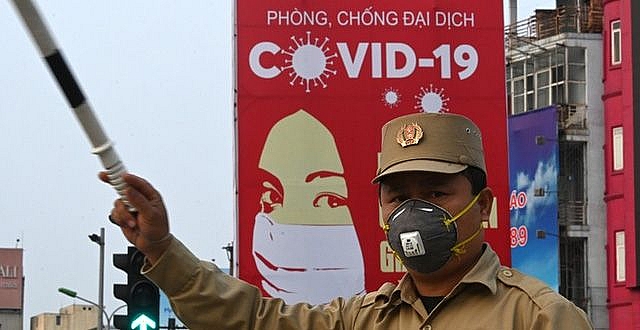 |
| Vietnam basically has the COVID-19 pandemic under control. (Photo: Reuters) |
The following is the full version of his article.
How did Vietnam do it? When the COVID-19 threatened to snowball with concomitant adverse consequences for the entire country, Vietnam’s motto, the key for fighting COVID-19, remained “prevention is better than cure”.
The three early combined measures that it took and worked successfully are mass testing, tracing down suspected individuals and quickly isolating them.
Other measures included social distancing order, body temperature checks of those arriving from overseas and numerous public communication campaigns to encourage citizens to follow preventive measures strictly.
Can Vietnam offer the world any lessons on containment strategy?
After its early success, Vietnam joined Greece, Slovenia, Jordan and Iceland in being officially recognized internationally as one of the five countries for both “flattening the curve” in terms of severely reducing COVID-19 cases, and also succeeding in treating patients, with the majority of cases enjoying a full recovery and successfully being reintegrated back into the community.
As a result of its success, Vietnam ordered schools to reopen, businesses to resume operation and people going back to living their normal life.
The common measures these five countries – three in Europe, one in West Asia and one on Southeast Asia – took to stem the virus’s spread included imposing lockdowns, testing thousands, and isolating the sick, encouraging social distancing and use of masks. As a result of these early measures, the five countries returned to normalcy in a quick time.
Vietnam is a densely populated country that shares a 1,281-kilometre border with China, where the outbreak first began. Travel across borders is relatively easy for the people of both China and Vietnam. Obviously it was feared that Vietnam would be vulnerable to virus outbreak as was China where it broke out in Wuhan.
| Read more |
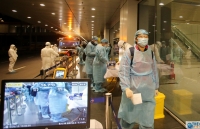 30 Vietnamese citizens repatriated from Wuhan 30 Vietnamese citizens repatriated from Wuhan |
Vietnam showed great awareness of the danger posed by the spread of the virus and took timely steps to check its further spread. In fact, Vietnam’s timely action preceded the World Health Organisation’s (WHO) declaration of the outbreak as a Public Health Emergency of International Concern. Its timely action contributed to the country reporting no COVID-19 deaths.
Without losing much time, Vietnam began testing soon after three people who had returned from Wuhan were confirmed to be carrying the deadly virus. So far approximately 300,000 people have been tested. Those tested were people arriving from areas hit by the COVID-19 and other epicenters, in addition to those who had contact with suspected cases, and those displaying symptoms of the virus. It is yet to confirm a single death from the disease. Vietnam had issued guidelines in December 2019 when it heard about the situation in China.
With a high density of population Vietnam has a weak health care system and a low budget for combating the COVID-19, but it is amazing that even when the pandemic rages in wealthy European countries more than 10,000 kilometers from China, Vietnam has largely been spared. How did Vietnam win the war by keeping its COVID-19 infection rate low?
Vietnam reported 327 infections (272 recovered) and no death since the outbreak began in January 2020. When the virus was still confined to China and had not even reached Vietnam, the Vietnamese government ‘declared war’ on the COVID-19. Prime Minister Nguyen Xuan Phuc declared “fighting this epidemic, means fighting the enemy”.
However, as mentioned earlier, Vietnam has some shortcomings such as inadequate government funding and not a very robust public health system. Vietnam does not have enough capacity to undertake a South Korea-style fight against COVID-19. The country’s medical system’s capacities are also limited. For example, the commercial city of Ho Chi Minh City with 8 million people has a total of 900 intensive care beds in the hospital. An epidemic, if it spreads, will easily overwhelm this capacity.
In order to overcome such deficiencies, Vietnam instituted rigorous quarantine policies, and carried out a complete tracing of all people who came in contact with the virus. Vietnam was a step ahead of China in implementing such measures and did not resort to the lockdown of entire cities like China as a last resort to keep the virus from spreading further.
Unlike in many European countries, Vietnam put an entire town near Ha Noi under quarantine for three weeks on February 12 even when there were only 10 confirmed COVID-19 cases in the entire country. Further, documentation of people who came in contact with affected people was meticulously made.
In contrast, Western countries only documented those infected and their direct contacts. Vietnam also kept track of second, third and fourth levels of contacts of infected persons, all of whom were then placed under successively stringent levels of movement and contact restrictions. Added to this was anyone arriving in Vietnam from a high-risk area was quarantined for 14 days. All schools and universities were closed since the beginning of February.
Vietnam’s surveillance state system also helped. Despite shortcomings in the medical system’s capacities and technology, Vietnam used its robust state security apparatus for widespread public surveillance. The state was also backed by a generally respected military. The close surveillance by the state machinery kept a tab on anyone from slipping through the net or evading regulations.
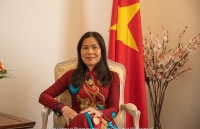 | Ambassador Ngo Thi Hoa shares Vietnam’s success in fighting against COVID-19 outbreak Former Ambassador of Vietnam to the Netherlands Ngo Thi Hoa recently shares Vietnam's achievements on COVID-19 fight on the Diplomat Magazine. The following is the full ... |
There was a downside to this as well. As is the case in many countries, including that in India as well, the nature of the virus is such that there is a sense of fear among the general populace. Unfortunately, this sense of fear has been stretched a bit too far to the extent of those falling victims of COVID-19 are ostracised in the community and on social media. Also, seen differently, the fear of social ostracism of those falling sick automatically puts pressure on them to submit to government regulations.
Prime Minister Nguyen Xuan Phuc kept on reminding the people that “every business, every citizen, every residential area must be a fortress to prevent the epidemic”. Such war-like rhetoric was well received by the people, proud of their ability to stand together in a crisis and endure hardships. The role of the media in undertaking massive information campaign cannot be underestimated either.
The people of Vietnam who take pride in their nationalism and feel supremely confident of their ability to fight any adversary in order to defend the country fully cooperated with the government in following measures in a war-like mode. This can be demonstrated from the fact that the country fared comparatively well in meeting the crisis. The economic costs despite the low number of cases would nevertheless be heavy but the people are seen to have accepted the hardship as the battle to defeat the virus has to be won.
The government was not afraid even if it meant closing down 3,000 businesses in the first two months of 2020. Big conglomerates like the Vin Group shuttered dozens of hotels and resorts due to the drop in tourism, costing employees their jobs.
To ease the burden, the government made available $1.1 billion to pump liquidity into the economy. However, it is feared that tax revenues could dry up because of the crisis. The government has called for voluntary donations and people are responding positively so that the government can cope with the crisis and fight against COVID-19.
Import Dimension of COVID-19
Sharing a long border with China, Vietnam was not immune from the issue of imported COVID-19 cases. Though the government responded quickly with measures to contain the virus from spreading, the economy took a hit. Out of the more than 30,000 people Vietnam tested, 37 foreigners and 136 Vietnamese were infected with COVID-19. Several big cities like Ha Noi, Da Nang and Hai Phong saw confirmed cases of new infections.
Fearing that Vietnamese returning from overseas and other foreigners arriving in Vietnam could be potential carriers of the virus, overseas Vietnamese were advised to reconsider their return plan for the sake and benefit of the nation.
However, when new cases were found, they were Vietnamese expatriates returning home to avoid the COVID-19 outbreak spreading in the UK, Italy and the US. The biggest city in the country, Ho Chi Minh City that saw most infected cases had origins from people returning from overseas. The local authorities were forced to order closing all bars, restaurants, and entertainment centers until the end of March.
On March 22, Prime Minister Nguyen Xuan Phuc ordered relevant authorities to suspend entry for foreign nationals entering the country, including those of Vietnamese origin and family members with visa waivers. Even when they did enter the country, they were required to fulfill health declaration and follow a 14-day quarantine procedure.
Foreign experts, business managers, high-skilled workers carrying official documents endorsing their travel plans, and approved by the Vietnamese government, were allowed to enter the country but were isolated at their accommodation establishments. The Vietnamese Prime Minister also ordered the suspension of all international flights coming to Vietnam, without giving a specific time frame. Entry to the country was also restricted by air, road and sea.
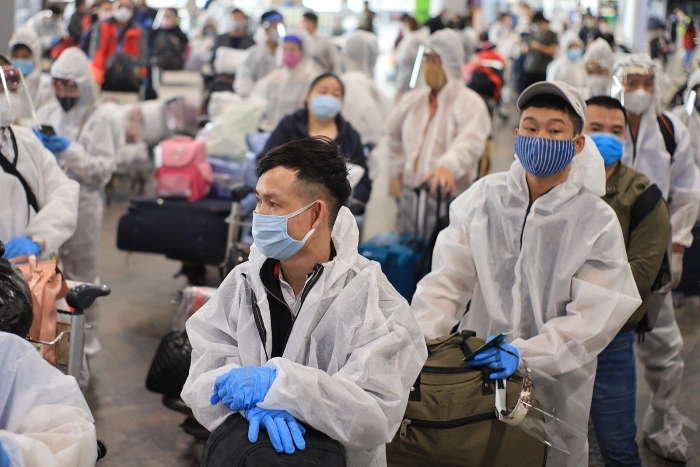 |
| The government made a list of overseas Vietnamese and students who need to return home and organize flights for them. (Photo: Bao Chi) |
The government made a list of overseas Vietnamese and students who needed to return home and organize flights for them. The overseas embassies were advised that they should recommend Vietnamese living abroad not to “return home if it is not really necessary”.
But Prime Minister Phuc was emphatic: “All people who enter Vietnam must be strictly quarantined and violators will be heavily punished”. Vietnam suspended visas for all foreign arrivals and all those arrived were put in quarantine for two weeks.
PM Phuc also urged the people to increase online transactions, use more phones at work and less direct communication to avoid the risk of infection. He appealed believers to pray and practice religious matters at home and asked not to hold wedding anniversaries and crowded parties to deal with every aspect of life like it was wartime.
National flag carrier Vietnam Airlines announced the suspension of all its international flights from March 25. While budget airline Vietjet Air suspended all flights to China and South Korea and halted flights to Southeast Asian countries, it continued to operate flights to India, Taiwan (China) and Japan. All non-essential businesses were shut and restrictions on movement were imposed.
Vietnamese people were willing to make sacrifices for greater goals. Self-sacrifice by some Vietnamese soldiers offering bed spaces at arrivals at military-run quarantine centres became a talking point of peoples’ sacrifice and depth of cooperation for national interests.
One can see a sense of national pride among the Vietnamese people to keep the COVID-19 under control from spiking. Vietnam’s political leadership in the country’s robust response was indeed commendable. So far, the efforts have been successful and there is not a single case of death because of COVID-19. But the country needs to stay on alert for more time.
Like in India, public donation poured in Vietnam to support the government in fighting the pandemic. For example, Nestle Vietnam, a nutrition, health and wellness company, donated 12 billion VND ($ 515,129). Peoples were encouraged to pursue a healthy lifestyle and join hands to overcome the pandemic.
In coordination with La Vie company, a subsidiary of Nestle Group, the firm implemented a wide range of activities to support doctors, nurses, public security and military forces, and volunteers who are in the front line of the battle against the disease. It also provided food, nutrition drinks, and cash, besides close to 300,000 relief packages and medical face masks to be sent to hospitals, health centers, functional forces and volunteers in some localities nationwide.
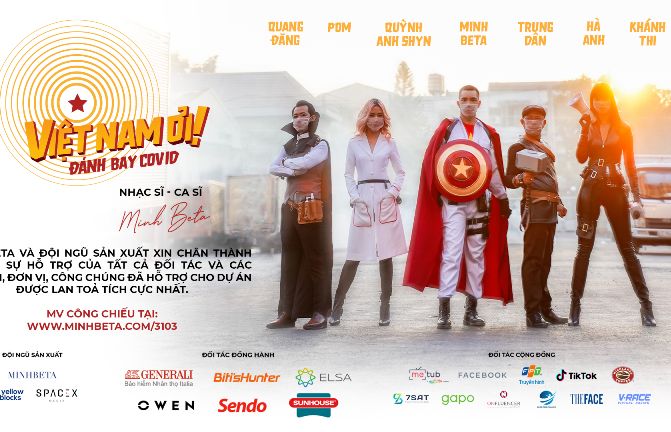 | Vietnamese music video "Viet Nam oi! Danh Bay COVID" makes foreign headlines The music video “Viet Nam oi! Danh Bay COVID” (Let’s Fight COVID!) from artist and entrepreneur Minh Beta has made headlines in foreign newspapers. |
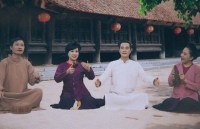 | Fighting against COVID-19 pandemic with traditional music After many modern tunes have encouraged citizens to help stop the COVID-19 pandemic, now it is the turn of traditional Vietnamese music. One of the ... |
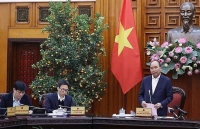 | Fighting nCoV like fighting enemy: PM In the face of complex developments of the acute respiratory disease caused by the novel coronavirus (nCoV), Prime Minister Nguyen Xuan Phuc chaired an urgent ... |

















